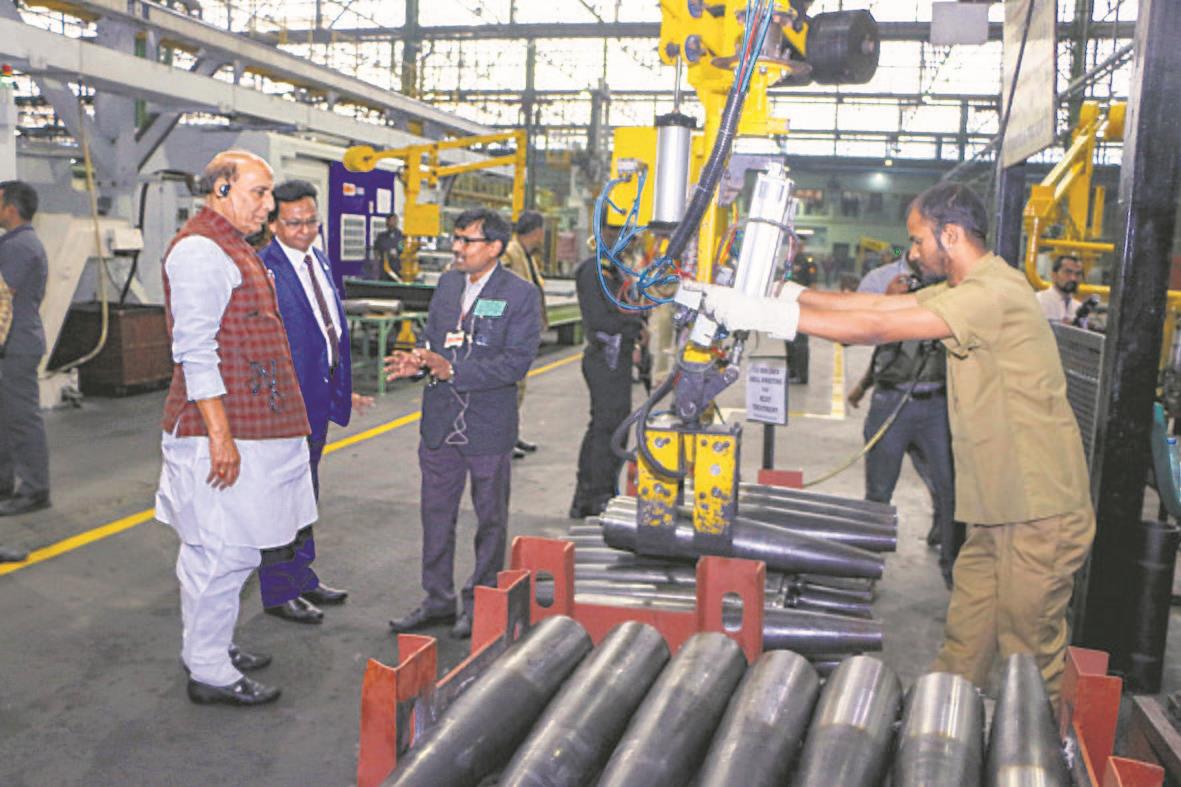
SOURCE: TRIBUNE INDIA
TAKING a cue from the PM’s call for a self-reliant India, the Department of Military Affairs, Ministry of Defence, recently prepared a list of 101 items to be embargoed from import beyond the stipulated timeline. This is a major step towards becoming self-reliant in defence. It offers an opportunity to India’s defence manufacturing industry to ramp up production, using its own design and development capabilities or adopting technologies developed by the Defence Research and Development Organisation (DRDO) to meet the requirements of the armed forces.
The intention of indigenisation is desirable and extremely essential, but India’s ordnance factories and defence public sector undertakings (PSUs) have not exhibited the needed competence for achieving it. India has been one of the biggest global importers of defence items. This can impact its strategic autonomy during a crisis. Any country that imports a greater percentage of its defence items will always remain vulnerable to the complexities of geopolitics. Reducing import dependency is a must.
Whenever there has been a border clash or a major terror attack, India has resorted to emergency purchases. It clearly indicates that our Ordnance Factory Board (OFB) has not provided the required support and the system laid by the Ministry of Defence for the procurement of weapons and equipment within a time frame is not functioning efficiently, resulting in emergency purchases during a crisis.
The OFB functions under the Department of Defence Production. With 41 ordnance factories, it was to play a major role in making armed forces self-reliant. However, lack of professional attitude that is required from a production organisation has impacted indigenisation efforts.
The armed forces have been regularly raising concerns about high overhead costs, inconsistent quality and delay in supply on various fora, leading to the setting up of various committees to look into this challenge. All recommendations of structuring have remained confined to the files and whenever there has been a move forward, it has been blocked by pressure tactics. The OFB has the monopolistic advantage of supply. Minimal innovation and technology development has led to low productivity. Moreover, zero penalty for delayed delivery to the end customers and lack of a structured, dynamic feedback mechanism have added to the woes.
Restructuring of the OFB has been examined by various committees in the past. Their observations indicate that sustaining the ordnance factories in the existing structure is financially and strategically costly to the armed forces, hence increasing the burden of import and impacting the country’s defence preparedness. The existing set-up of ordnance factories faces the prospect of obsolescence. Unless there is a migration to a newer technology, the expectations from the factories will not be met.
The conversion of the OFB into the Ordnance Factory Corporation Limited has been recommended by various committees. This will enable them to rely on their own strengths, revenues and surpluses for growth. The proposed structure would also enable appropriate future changes in line with the dynamic global environment related to the production of defence goods. With a sharpened focus and an innovative approach to the competitive ground reality, the corporation would endeavour to add value to the sector not just in India but also for the world.
The TKA Nair Committee (2000), Dr Vijay Kelkar Committee (2004), Raman Puri Committee (2015) and Shekatkar Committee (2016) have recommended the corporatisation of the OFB. Based on these reports and to strengthen self-reliance in defence production, the government decided in May 2020 that under the Atmanirbhar Bharat package, the corporatisation of the OFB would be undertaken to improve autonomy, accountability and efficiency in ordnance supplies.
Corporatisation of the OFB will address some key issues that plague the ordnance factories — high cost and poor quality. Cases of defective assemblies and components have been highlighted on different fora. A high rate of return for rectification cases indicates poor quality management and quality consciousness.
It is essential to change the existing functioning of the OFB as an attached office of the Ministry of Defence and a budgeted entity since it is completely incompatible with the modern methods of production and practices.
The formation of a corporation would ensure that ordnance factories get the desired functional autonomy and will yet make them accountable and responsible for their operations and performances. Splitting the OFB into three or four segments as appropriate and converting these segmented boards into defence public sector undertakings (DPSU), as recommended, seems to be the way forward.
India’s current leadership is committed to big-time changes with a focus on national security. It is the most appropriate time to take the overdue step of corporatisation of the OFB to address the key challenges of ordnance factories for making our country more self-reliant in defence production.






